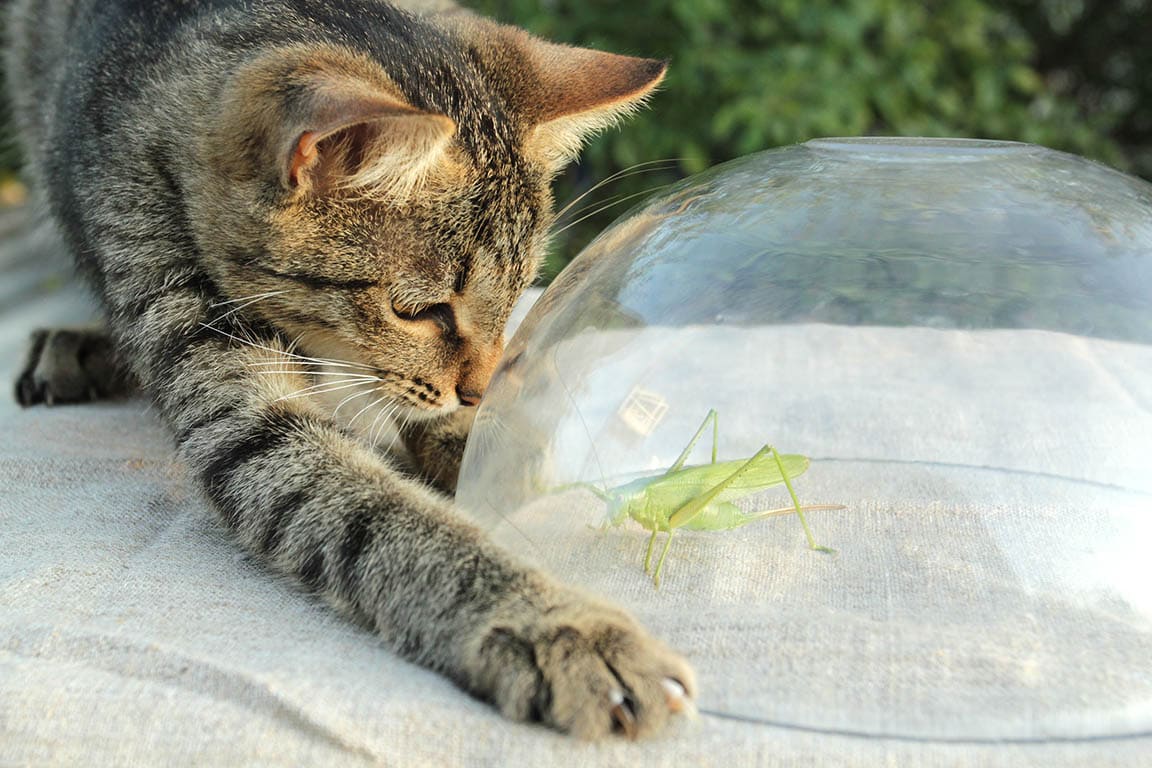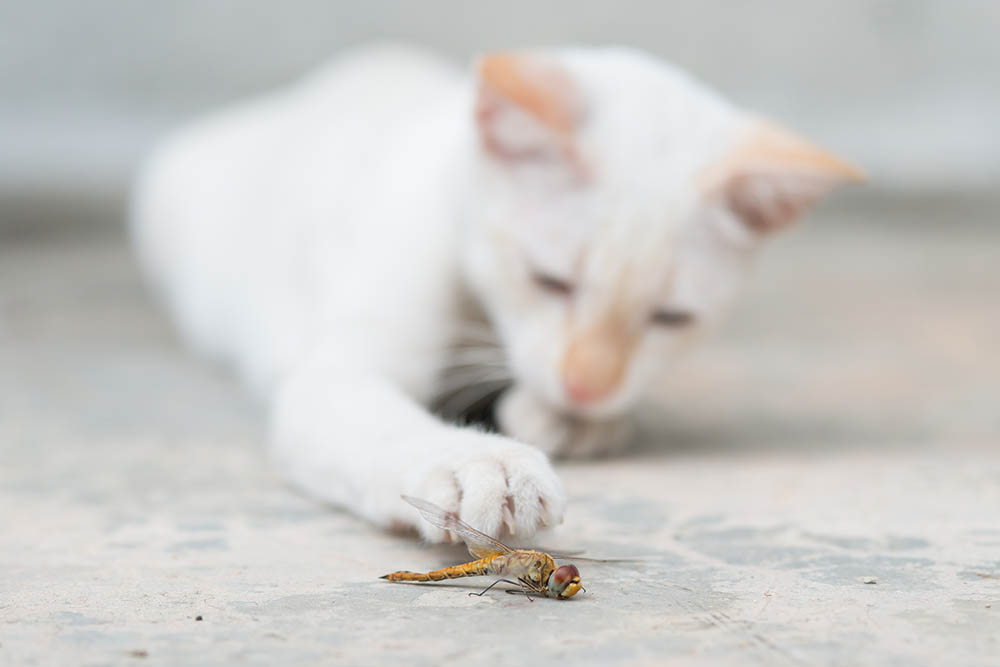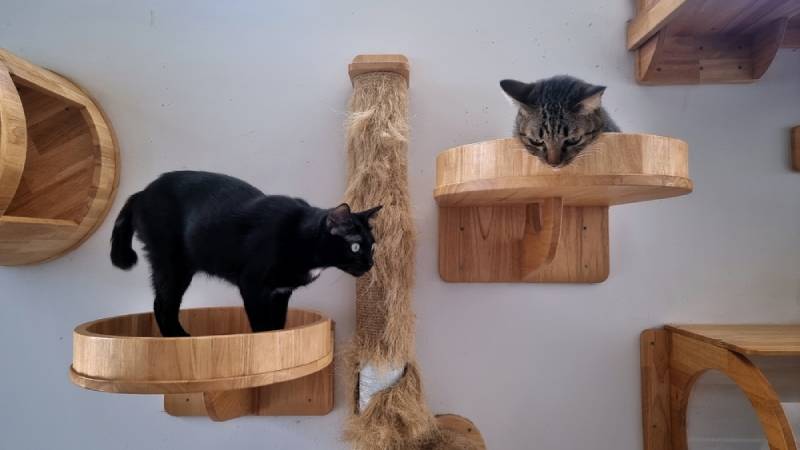Can Cats Eat Bugs? Vet-Reviewed Health & Safety Guide

By Misty Layne
Updated on

Cats may not eat everything they come across like dogs do, but they do sometimes eat things that make us go, “Eww!” Take bugs, for example. You’ve likely seen your cat have a bug catch its attention, then watched as they stalked it throughout the house until they could get ahold of it.
But can cats eat bugs? Is it safe for them to consume them? The answer is that it’s mostly okay for cats to munch on an occasional bug, but some bugs are more dangerous than others.
Is It Fine for Cats to Eat Bugs?
For the most part, it’s fine for our furry friends to hunt and eat the occasional bug. It keeps them entertained and lets them follow their instincts. Plus, some bugs provide a bit of nutrition, such as protein, trace minerals, and B vitamins, for your kitty. In fact, some pet food industries have started moving towards insect-based foods for animals.

Why Do Cats Go After Bugs?
Our feline friends are natural predators, so it’s no surprise they go after prey smaller than them. And bugs are particularly attractive given that they’re not only small but quick. Add to that the way they move about—in random directions or staying completely still for a minute before darting off—and to your cat, it’s a perfectly crafted invitation for play.
The hunting instinct doesn’t necessarily mean they’ll eat a bug after they’ve killed it, though. Oftentimes, cats will stalk and kill prey just to satisfy instincts or to have fun.
Bugs with bugs
You may worry about bugs carrying parasites or germs that can harm your beloved kitty. This is a possibility in a few instances and should be monitored for. Most backyard critters however, are not cause for concern. A few of those you should watch out for are listed below.
The Cuterebra, or botfly, is one such bug that can infect your cat—though the infection actually comes from rodents your pet hunts and kills, and not because they were chasing after the bug itself. Cats are accidental hosts for botflies and usually come across the larvae near where the affected rodents are living. The result is warbles, or small lumps, underneath your pet’s skin that have a tiny hole at the top. It’s best to keep your cat from hunting mice and rats to avoid this situation.
Then, there are mosquitoes that can carry heartworm larvae. When these mosquitoes bite your pet, these larvae can be injected into the bloodstream and travel to areas around the heart. Unfortunately, there aren’t many signs you can look for to see if your cat has heartworm. Usually, symptoms include rapid breaths or coughing, which can be symptoms of a host of illnesses. Cats living in heartworm affected areas should be on effective prevention available at your veterinary clinic.
Cockroaches have been shown to spread salmonella amongst other diseases and this can cause food poisoning signs in both your furred and human family.
Finally, you have fleas and ticks, with which you’re familiar. Not only can fleas and ticks cause itchiness and irritation to your cat’s skin, but they can also carry tapeworm eggs, bacteria and blood borne parasites that can be transferred to your pet. They can even infect your kitty with the organism known for causing infectious anemia in felines.

What About Pesticides?
So, now you know that there are only a few bugs that will harm your cat if they eat them and some that will harm them externally. But what about insecticides? Won’t some bugs be carrying traces of these if you’ve sprayed around the house to get rid of bugs and insects? You don’t want your pet near that!
This is also an instance where there’s really no need to worry. Bugs that have gotten into insecticides will have an incredibly low amount of the poison itself in them, meaning there’s minimal risk of it affecting your cat.
The more significant risk is your feline friend directly getting into any toxins you’ve sprayed in your home. That’s why it’s incredibly important you read the labels of insecticides before using them to make sure they don’t contain ingredients that can harm your pet. If you believe your cat has ingested an insecticide, contact your vet or poison control immediately.
Bugs Toxic to Cats
As we said, ingesting a bug or insect will rarely harm your kitty, but there are a few bugs you should try to keep your cat away from because they can harm you with or without ingestion. These include:
- Poisonous spiders. Some spider bites can harm a human and can also harm a cat.
- Caterpillars. As cute as they are, some caterpillars can be poisonous for your kitty both externally and internally. Externally, they can cause pain, rashes, and skin irritation. Internally, they can cause difficulty swallowing, head shaking, and gastritis.
- Stinging insects. Insects such as bees or wasps can, on very rare occasions, cause an allergic reaction in a cat.
- Not everyone has to deal with scorpions, but if they are frequent household visitors to your home when the weather is warm, you’ll need to keep an eye on your feline. Most likely, if your cat is harmed by one of these, it will just be a painful sting. But, sometimes more severe reactions occur, such as trouble breathing or vomiting.
- Fire ants. Black ants don’t pose a risk to your pet, but fire ant bites can be not only painful but may cause an allergic reaction.
- Hard-bodied bugs – bugs like roaches or crickets aren’t toxic to cats, but they will likely cause stomach upset if eaten.
Can I Stop My Cat from Eating Bugs?
It’s challenging to stop your cat from eating bugs, but there are a couple of things you can do to decrease the number of bugs they have access to.
Firstly, you can try to keep bugs out of your home. There’s really no way to keep your house 100% bug-free, but you can make a good start at it by keeping unscreened windows and doors closed during warm weather. Also, be sure your house is clean and get rid of any dead bugs you find so your pet won’t be able to eat them. Finally, if you have a bug infestation of any kind, call a pest control company, or spray your home for bugs yourself (just make sure that any insecticide used won’t be harmful to your cat!).
Another way to reduce the number of bugs your kitty can get to is by keeping your cat indoors. Even if you keep an eye on your pet while they are outside, you likely won’t catch everything they do or get into. And, since the great outdoors has many more bugs than the inside of your home, it’s more likely your pet will eat a bug there.

Conclusion
Cats can eat bugs, and most of the time, it won’t harm them in any way. But, since there are a few instances where ingesting bugs (or simply hunting them) can cause your pet to be ill or injured, it’s best to try to reduce the number of bugs and insects your kitty can get to. You can do this by keeping your cat inside and by spraying your home with pet-friendly insecticides to lower the number of bugs found indoors. If you think your cat has eaten or tangled with a bug that is harmful to them, get them to a vet straight away or call poison control. For the most part, though, there’s no reason to be worried over your feline friend eating a bug or two here and there!
Related Read:
- Are Ladybugs Poisonous to Cats? Keeping Your Cat Safe
- Can Cats Eat Birds? Vet Approved Facts & Safety Guide
Featured Image Credit: Mylene2401, Pixabay













